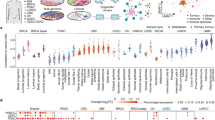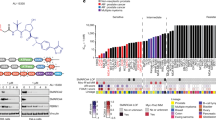Abstract
PSP94, for prostatic secretory protein of 94 amino acids, is secreted by the prostate gland and functions as a suppressor of tumor growth and metastasis. The expression of PSP94 is lost in advanced, hormone-refractory prostate cancer and this correlates with an increased expression of the Polycomb protein EZH2 (enhancer of zeste homolog 2), which represses transcription via trimethylation of histone H3 on Lys27 (H3K27). We show here that these events are causally related and that the MSMB gene, which encodes PSP94, is trimethylated on H3K27 in androgen-refractory, but not in androgen-sensitive prostate cancer cells. Chromatin immunoprecipitation experiments confirmed an association of EZH2 with the MSMB gene. The RNAi-mediated knockdown of EZH2 resulted in a loss of H3K27 trimethylation and an increased expression of the MSMB gene. Conversely, the overexpression of EZH2 was associated with a decreased expression of the MSMB gene. We also demonstrate that MSMB is additionally repressed in androgen-refractory prostate cancer cells by the hypoacetylation of histone H3K9 and the hypermethylation of a CpG island in the promoter region. Our data disclose a hitherto unexplored link between the putative oncogene EZH2 and the tumor suppressor PSP94, and show that MSMB is silenced by EZH2 in advanced prostate cancer cells.
This is a preview of subscription content, access via your institution
Access options
Subscribe to this journal
Receive 50 print issues and online access
$259.00 per year
only $5.18 per issue
Buy this article
- Purchase on Springer Link
- Instant access to full article PDF
Prices may be subject to local taxes which are calculated during checkout




Similar content being viewed by others
References
Annahi B, Bozeghrane M, Currie JC, Hawkins R, Dulude H, Daigneault L et al. (2005). A PSP94-derived peptide PCK3145 inhibits MMP-9 secretion and triggers CD44 cell surface shedding: implications in tumor metastasis. Clin Exp Mestas 22: 429–439.
Bracken AP, Dietrich N, Pasini D, Hansen KH, Helin K . (2006). Genome-wide mapping of Polycomb target genes unravels their roles in cell fate transitions. Genes and Dev 20: 1123–1136.
Bracken AP, Pasini D, Capra M, Prosperini E, Colli E, Helin K . (2003). EZH2 is downstream of the pRB-E2F pathway, essential for proliferation and amplified in cancer. EMBO J 20: 5323–5335.
Cao R, Zhang Y . (2004). SUZ12 is required for both the histone methyltransferase activity and the silencing function of the EED-EZH2 complex. Mol Cell 15: 57–67.
Garde SV, Basrur VS, Li L, Finkelman MA, Krishnan A, Wellham L et al. (1999). Prostate secretory protein (PSP94) suppresses the growth of androgen-independent prostate cancer cell line (PC-3) and xenografts by inducing apoptosis. Prostate 38: 118–125.
Kirmizis A, Bartley SM, Kuzmichev A, Margueron R, Reinberg D, Green R et al. (2004). Silencing of human polycomb target genes is associated with methylation of histone H3 Lys 27. Genes Dev 18: 1592–1605.
Lamy S, Ruiz MT, Wisniewski J, Garde S, Rabbani SA, Panchal C et al. (2006). A prostate secretory protein 94-derived synthetic peptide PCK3145 inhibits VEGF signalling in endothelial cells: implication in tumor angiogenesis. Int J Cancer 118: 2350–2358.
LaTulippe E, Satagopan J, Smith A, Scher H, Scardino P, Reuter V et al. (2002). Comprehensive gene expression analysis of prostate cancer reveals distinct transcriptional programs associated with metastatic disease. Cancer Res 62: 4499–4506.
Martin C, Zhang Y . (2005). The diverse functions of histone methylation. Nat Rev Mol Cell Biol 6: 838–849.
Ringrose L, Paro R . (2004). Epigenetic regulation of cellular memory by the polycomb and trithorax group proteins. Annu Rev Genet 38: 413–443.
Saramäki OR, Tammela TLJ, Martikainen PM, Vessella RL, Visakorpi T . (2006). The gene for polycomb group protein enhancer of zeste homolog 2 (EZH2) is amplified in late-stage prostate cancer. Gen Chrom Cancer 45: 639–645.
Shukeir N, Arakelian A, Chen G, Garde S, Ruiz M, Panchal C et al. (2004). A synthetic 15-mer peptide (PCK3145) derived from prostate secretory protein can reduce tumor growth, experimental skeletal metastasis, and malignancy-associated hypercalcemia. Cancer Res 64: 5370–5377.
Shukeir N, Arakelian A, Kadhim S, Garde S, Rabbani SA . (2003). Prostate secretory protein PSP-94 decreases tumor growth and hypercalcemia of malignancy in a syngenic in vivo model of prostate cancer. Cancer Res 63: 2072–2078.
Stanbrough M, Bubley GJ, Ross K, Golub TR, Rubin MA, Penning TM . (2006). Increased expression of genes converting adrenal androgens to testosterone in androgen-independent prostate cancer. Cancer Res 66: 2815–2825.
van der Vlag J, Otte AP . (1999). Transcriptional repression mediated by the human polycomb protein EED involves histone deacetylation. Nat Genet 23: 474–478.
Vanaja DK, Cheville JC, Iturria SJ, Young CYF . (2003). Transcriptional silencing of zinc finger protein 185 identified by expression profiling is associated with prostate cancer progression. Cancer Res 63: 3877–3882.
Varambally S, Dhanasekaran SM, Zhou M, Barrette TR, Kumar-Sinha C, Sanda MG et al. (2002). The polycomb group protein EZH2 is involved in progression of prostate cancer. Nature 419: 624–629.
Viré E, Brenner C, Deplus R, Blanchon L, Fraga M, Didelot C et al. (2006). The Polycomb group protein EZH2 directly controls DNA methylation. Nature 439: 871–874.
Acknowledgements
This work was financially supported by the Fund for Scientific Research-Flanders (Grant G.0290.05), a Flemish Concerted Research Action and the Prime Minister's office (IAP/V-05). Fabienne Withof provided expert technical assistance.
Author information
Authors and Affiliations
Corresponding author
Rights and permissions
About this article
Cite this article
Beke, L., Nuytten, M., Van Eynde, A. et al. The gene encoding the prostatic tumor suppressor PSP94 is a target for repression by the Polycomb group protein EZH2. Oncogene 26, 4590–4595 (2007). https://doi.org/10.1038/sj.onc.1210248
Received:
Revised:
Accepted:
Published:
Issue Date:
DOI: https://doi.org/10.1038/sj.onc.1210248
Keywords
This article is cited by
-
Prostate-specific markers to identify rare prostate cancer cells in liquid biopsies
Nature Reviews Urology (2019)
-
EZH2 promotes cell proliferation by regulating the expression of RUNX3 in laryngeal carcinoma
Molecular and Cellular Biochemistry (2018)
-
Targeting EZH2 in cancer
Nature Medicine (2016)
-
Gene amplification of the histone methyltransferase SETDB1 contributes to human lung tumorigenesis
Oncogene (2014)
-
Context-specific regulation of cancer epigenomes by histone and transcription factor methylation
Oncogene (2014)



